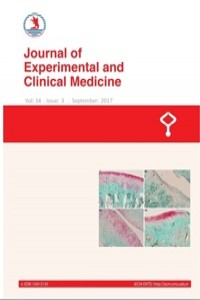Abstract
Propolis has antioxidant, anti-inflammatory and
immunomodulatory features. It also has protective effects in human chondrocyte
cultures. These effects of propolis are associated to its constituents like
pinocembrin, and caffeic acid phenethyl ester. The aim of this study was to
expose the effects of propolis in terms of cartilage tissue protection on an
experimental osteoarthritis model in rats. Twenty-eight Sprague Dawley rats
divided into four equal groups (Arthrotomy: A, Surgical control: SC, Propolis
100: P1, and Propolis 200: P2). Following right knee arthrotomy the medial
meniscus was removed in groups SC, P1 and P2. The surgical procedure was
concluded after arthrotomy in Group A. A solution prepared from propolis
extract was administered from the first day for five weeks by the orally in
doses of 100 mg/kg/day to the rats in the P1 group and 200 mg/kg/day to the
rats in the P2 group. At the end of the study, specimens taken from the medial
tibial joints were assessed histologically based on the Mankin scoring system.
Compared to the SC group the histological results from both of the groups
receiving propolis treatment were significantly better (p<0.001 for both).
However, there was no significant difference between the P1 and P2 groups
(p=0.506). In conclusion, propolis was
observed to reduce cartilage degeneration in an experimental model of OA. We
attribute this to the effect to the components that contained in propolis, such
as pinocembrin and caffeic acid phenethyl ester.
Keywords
References
- Borrelli, F., Maffia, P., Pinto, L., Ianaro, A., Russo, A., Capasso, F., Ialenti, A., 2002. Phytochemical compounds involved in the anti-inflammatory effect of propolis extract. Fitoterapia. 73, 53-63.
- Cardile, V., Panico, A., Gentile, B., Borrelli, F., Russo, A., 2003. Effect of propolis on human cartilage and chondrocytes. Life Sci. 73, 1027-1035.
- Guney, A., Karaman, I., Oner, M., Yerer, M.B., 2011. Effects of propolis on fracture healing: An experimental study. Phytother. Res. 25, 1648-1652.
- Yüce, S., Gökçe, E.C., Işıkdemir, A., Koç, E.R., Cemil, C.B., Gökçe, A., Sargon, M.F., 2015. An experimental comparison of the effects of propolis, curcumin and methylprednisolone on crush injuries of the sciatic nerve. Ann Plast Surg. 74, 684-92.
Abstract
References
- Borrelli, F., Maffia, P., Pinto, L., Ianaro, A., Russo, A., Capasso, F., Ialenti, A., 2002. Phytochemical compounds involved in the anti-inflammatory effect of propolis extract. Fitoterapia. 73, 53-63.
- Cardile, V., Panico, A., Gentile, B., Borrelli, F., Russo, A., 2003. Effect of propolis on human cartilage and chondrocytes. Life Sci. 73, 1027-1035.
- Guney, A., Karaman, I., Oner, M., Yerer, M.B., 2011. Effects of propolis on fracture healing: An experimental study. Phytother. Res. 25, 1648-1652.
- Yüce, S., Gökçe, E.C., Işıkdemir, A., Koç, E.R., Cemil, C.B., Gökçe, A., Sargon, M.F., 2015. An experimental comparison of the effects of propolis, curcumin and methylprednisolone on crush injuries of the sciatic nerve. Ann Plast Surg. 74, 684-92.
Details
| Journal Section | Internal Medical Sciences |
|---|---|
| Authors | |
| Publication Date | July 10, 2018 |
| Submission Date | January 10, 2017 |
| Published in Issue | Year 2017 Volume: 34 Issue: 3 |
Cite

This work is licensed under a Creative Commons Attribution-NonCommercial 4.0 International License.


